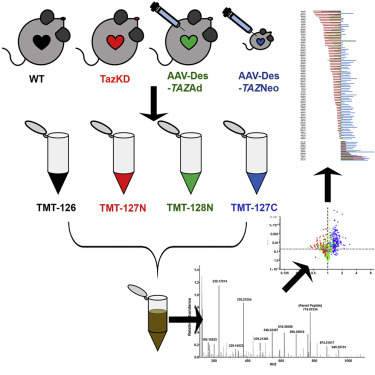Molecular Therapy - Methods & Clinical Development ( IF 4.6 ) Pub Date : 2019-01-25 , DOI: 10.1016/j.omtm.2019.01.007 Silveli Suzuki-Hatano , Madhurima Saha , Meghan S. Soustek , Peter B. Kang , Barry J. Byrne , W. Todd Cade , Christina A. Pacak

|
Barth syndrome (BTHS) is a rare mitochondrial disease that causes severe cardiomyopathy and has no disease-modifying therapy. It is caused by recessive mutations in the gene tafazzin (TAZ), which encodes tafazzin—an acyltransferase that remodels the inner mitochondrial membrane lipid cardiolipin. To identify novel mechanistic pathways involved in BTHS and evaluate the effects of gene therapy on proteomic profiles, we performed a multiplex tandem mass tagging (TMT) quantitative proteomics analysis to compare protein expression profiles from heart lysates isolated from BTHS, healthy wild-type (WT), and BTHS treated with adeno-associated virus serotype 9 (AAV9)-TAZ gene replacement as neonates or adults. 197 proteins with ≥2 unique peptides were identified. Of these, 91 proteins were significantly differentially expressed in BTHS compared to WT controls. Cause-effect relationships between tafazzin deficiency and altered protein profiles were confirmed through demonstrated significant improvements in expression levels following administration of AAV9-TAZ. The importance of TMEM65 in Cx43 localization to cardiac intercalated discs was revealed as a novel consequence of tafazzin deficiency that was improved following gene therapy. This study identifies novel mechanistic pathways involved in the pathophysiology of BTHS, demonstrates the ability of gene delivery to improve protein expression profiles, and provides support for clinical translation of AAV9-TAZ gene therapy.
中文翻译:

AAV9 TAZ基因置换改善了Barth综合征小鼠模型中的心脏TMT蛋白质组学特征。
Barth综合征(BTHS)是一种罕见的线粒体疾病,可引起严重的心肌病,并且没有可改善疾病的疗法。它是由tafazzin(TAZ)基因的隐性突变引起的,该基因编码tafazzin(一种重塑线粒体内膜脂质心磷脂的酰基转移酶)。为了确定参与BTHS的新机制途径并评估基因治疗对蛋白质组学谱的影响,我们进行了多重串联质量标记(TMT)定量蛋白质组学分析,比较了从BTHS分离的心脏裂解物中的蛋白表达谱,健康的野生型(WT ),以及与BTHS腺相关病毒血清型9(AAV9)处理- TAZ基因替代,无论是新生儿还是成人。鉴定出具有≥2个独特肽的197种蛋白质。其中,与野生型对照相比,BTHS中有91种蛋白显着差异表达。通过证明在施用AAV9- TAZ后表达水平的显着改善,证实了tafazzin缺乏与蛋白谱改变之间的因果关系。TMEM65在Cx43定位于心脏插层盘中的重要性已被揭示为他法辛缺乏症的一种新结果,该结果在基因治疗后得到了改善。这项研究确定了BTHS病理生理学中涉及的新机制途径,证明了基因传递改善蛋白质表达谱的能力,并为AAV9- TAZ的临床翻译提供了支持 基因治疗。































 京公网安备 11010802027423号
京公网安备 11010802027423号